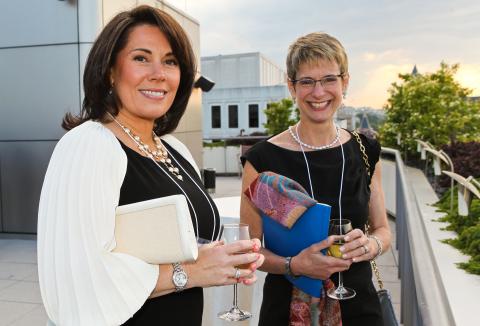
Elizabeth Garrett (right) and friend in 2013.
The AAPSS community is saddened by the passing of AAPSS Fellow Elizabeth Garrett, who died at her home in New York City on Sunday from colon cancer. Professor Garrett was the first female president of Cornell University–a job she had taken only eight months prior to her passing. Before going to Cornell, Garrett was the Provost of and Senior Vice President of Academic Affairs at the University of Southern California. She was also the first female provost of USC. In addition to her administrative appointments at USC, Garrett embodied the cross disciplinary scholarship that the AAPSS so values, with appointments in Law, Political Science, and Public Policy.
In addition to her career as a legal scholar, Garrett clerked for Justice Thurgood Marshall on the Supreme Court, for Judge Stephen Williams on the U.S. Court of Appeals for the D.C. Circuit, and for Judge Howard Holtzmann on the U.S.-Iran Claims Tribunal at The Hague. Garrett’s public service and expertise extended beyond the court as well: she was Senator David L. Boren’s expert for tax, budget, and welfare reform issues; she was a presidential appointee in 2005 to the Bipartisan Advisory Panel on Federal Tax Reform; and was a member of the California Fair Political Practices Commission.
In 2013, Professor Garrett was elected as the Harold Lasswell Fellow of the AAPSS. She was nominated for an AAPSS fellowship by her friend and former colleague at USC, and AAPSS Fellow, Geoffrey Cowan. In his nomination, Dr. Cowan called Garrett “perhaps the most influential legal scholar studying direct democracy.” Garrett was, he said, also among only a handful of scholars whose work influenced political science as well as legal analysis.
In her short time as president of Cornell, she lead an effort to combine three business programs into a College of Business. The launch of the new business school is planned for next academic year (2016-17). Of her role as the first female president of Cornell, Professor Garrett told the Times Higher Education magazine, “It is important for women and men to see strong and capable women in positions of leadership, so we understand that certain characteristics such as gender and race do not determine how well people do in those offices.”

